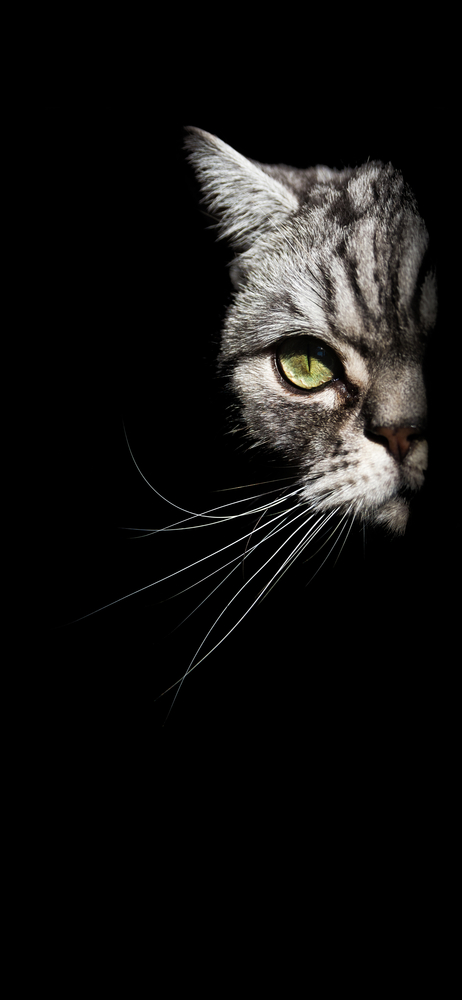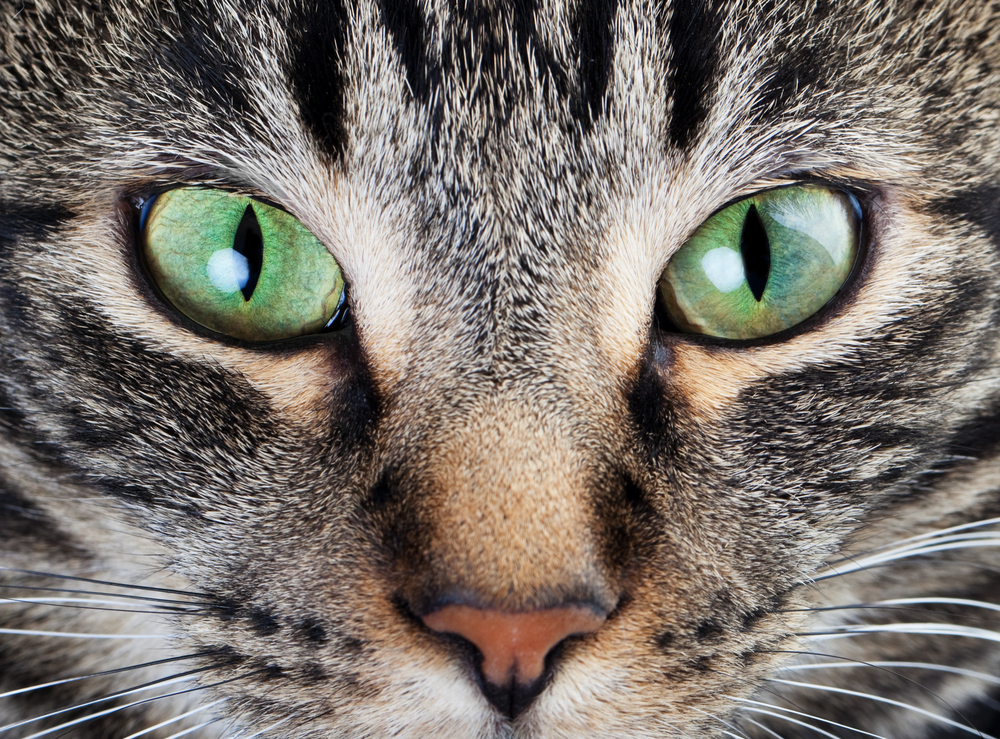
The majority of cats have excellent vision and can see well in low lights. Their vision is not the same as ours and they can see shapes and movement better, even when the light is low. Contrary to what some believe, they do need some light to see and cannot see things when it is pitch black.
Cats are well adapted to see in dim and dull light. They can see far better than us humans in the dark, though they do need some light source to be able to make out shapes and figures. Whether outside or at home, cats only need a low level of light to see where they’re going.
Our article examines how cats became accustomed through the years to be able to take advantage of low light and the science behind their eyesight. We also examine a fear of the dark and run through some good sleeping tips for your feline friend.
Do cats need light to see?

Cats cannot see when it is pitch black, however, most domestic cats are rarely faced with this situation. Their eyes are best adapted to low and normal light. As long as there is some form of light source; whether from the early morning sun, moon or an artificial light, your cat will be able to navigate their surroundings.
In most of our homes, there will be some source of light at all times. This may be from the moon or street lights shining in through the window, or from electrical devices such as televisions on standby mode and mobile phones. This suits cats well and they should be able to get around your home in ‘the dark’.
Do all cat breeds like the dark?

There is no difference in night vision from breed to breed. So, whether you have a Domestic Short Hair, Siamese or Cornish Rex, your cat will be well adapted to seeing in low light. Whether or not a cat ‘likes’ the dark or not depends more on their previous experiences and environment than their genetics.
Should I get my kitten a night light?

Your kitten will be better able to see in the dark than you. However, it is a sensible idea to have a light on when your kitten is young. This is more to prevent accidents, such as a person standing on the kitten when walking by. Motion lights work well, meaning they will switch off when you and your kitten are asleep, so you can both get some good quality shut eye.
It is important to have darkness to sleep so that melatonin can be produced. Sleeping with bright light can lead to disrupted sleep and is not recommended for cats of any age. You’ll likely find your kitty prefers having some hours of darkness; when they can fully unwind.
Choose a dimmable, motion sensor night light like this one. You can place the lights near spots your cat may need help seeing, such as beside their litter tray or water bowl. Do not have one near their bed.
Are LED lamps good for cats?
We have no reason to believe exposure to LED lights is harmful for our cats. They do not affect their vision adversely and can be used long-term. There is no need to source ‘cat specific’ LED lights and they can be purchased from your local supermarket or hardware store.
Will my kitten be scared in the dark?

While you may wonder if your kitten will find the dark hard to cope with, it is natural for them to be in darkness at nighttime. Indeed, artificial lighting 24/7 is not something they are designed to cope with.
Kittens have no reason to fear the dark. They are not a prey animal and have yet to hear any ghost stories! Even when a room seems very dark to you, there will likely be a small amount of light which should be sufficient for your kitten to get about.
If you’re concerned your kitten is having trouble locating their litter tray or water bowl at night, a kitty night light is a sensible solution.
What about Adult (older) cats?
Cats of any age should sleep in the darkness. This allows the pineal gland to produce melatonin, which promotes sleepiness. If we have artificial lights on around the clock, your older cat’s sleep cycle will be disturbed.
Sleep is restorative and is essential for healing and good health. Older cats who do not sleep enough may become run down and develop a weakened immune system, leaving them open to infection.
Most owners find their older cat does not need a light source at night. They know how to easily locate their litter box and food bowl without assistance. However, it is sensible to make sure they are coping well and you could consider a dim light if you find it is required. Typically, this would only be the case in a very dark house, perhaps in which the owner has black out blinds.
What if I think my cat is afraid of the dark?
While many humans have a darkness phobia, this is not something we typically see in our feline friends. However, if your cat has had a bad experience when it was dark, they may link this to the darkness. This might happen if they have experienced neglect or abuse, or if they became frightened during a fireworks event or thunderstorm at nighttime. It can also occur in cats who have been trapped in dark places, such as cellars or car boots.
If your cat becomes stressed by the dark, it is wise to leave a light on for them if you find this helps. Dim it to the lowest level they tolerate. You may also find your cat benefits from interventions such as anxiolytic medicine and a consultation with a feline behaviorist.
As well as ensuring your cat can see and get about during the night, there are a few other considerations given below.
Is it okay to lock my cat in a room at night?
No, ideally, we should never shut our cat in one spot at night as they like to roam. Some owners feel more comfortable blocking access to the upstairs with a baby gate; still allowing their cat some freedom.
Do some cats get scared of being alone at night?
You might find your cat is sensitive to being left alone at night and exhibits signs such as meowing, restlessness or trembling. This is unusual and tends to occur when they have had a difficult start in life or a bad experience in the dark. This is something that should be addressed with your vet and a feline behaviorist.
If your cat dislikes being alone, you may choose to let them in your room with you.
If scared, should my cat sleep in my bed or not?
Whether or not they are allowed on the bed is a very personal decision! Bedroom access won’t be for all owners but works well for some. If bedroom sharing isn’t for you, your cat may enjoy the radio left on downstairs at a low volume.
When is it time to see a vet?
If you have any concerns about your cat’s vision, schedule a visit with their vet. Perhaps they have begun bumping into things, can no longer judge short distances when jumping or you’ve noticed their eye looks different. Any squinting, cloudiness, redness, discharge or discoloration needs to be looked into promptly.
Your cat can suffer from a range of eye issues including infections, corneal ulcers, glaucoma and cataracts. As they only have two eyes and their vision is an integral part of their life, we must prioritize their ocular health.
some interesting Cat facts

Cats have evolved over the years to be excellent hunters. While this was initially how they got their meals, it is now more something they do for exercise and enjoyment. Cats, when given the choice, will typically hunt at dawn and dusk. This is because the weather will be cool and their prey animals (such as mice and birds) are out and about at this time. To be good hunters in this low light, they need to be able to see when it is dim.
Cats have naturally large pupils and corneas so can allow a lot of light in. This light hits off the retina and is converted to images. Thus, even when the light is low, cats have a good idea of what is going on around them. The ‘vertical slit’ pupil that your kitty has offers better night and low vision than a human’s round opening . Therefore, you’ll find your cat can see much better in low light than you.
Cats have a high concentration of rods and a lower concentration of cones in their retina. This means they cannot see colors in great detail but can generally make them out. Most experts agree that they are red green color blind. Their eyes are better suited to seeing objects that are close up; an advantage when hunting prey at short distances.
When it comes to detailed images, such as a human’s face, cats are not very good at seeing them. Rather than rely on their vision to recognize their owner, they use other senses such as their smell.
Though cats cannot see infrared light, it is believed they can seek out heat in a more efficient manner than us humans. The heat receptors in their skin work well to tell them where is the coziest spot in the home; who would have thought it?!
Additional FAQ’s:
How cats see their prey/other animals in the dark?
Cats have a natural urge to hunt when dark as this is when they are most successful. Their eyes have been adapted to pick up the shape and motion of their prey, even in low light. Cats have excellent peripheral vision, so can scan around them for any approaching animals.
How do felines find way to their home (without light)?
When outdoors, there is always some degree of light to see with. This is true even in rural areas thanks to the moon and stars. However, cats also rely on their instincts, memory and sense of smell to find their way home.
Pin & Share our Quick Overview!

Conclusion
Our cuddly kitties are well able to see in low light and should be able to get around well within our homes at night. Their eyes have adapted over time to navigate the world, even when there is not much light available. If desired, we can use dimmable night lights, especially for younger kittens.
Please Share Your Thoughts in the Comment Section Below!
Happy Cat Care!
